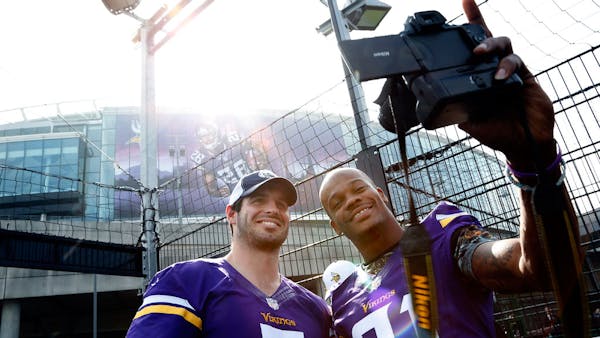When the Minnesota Vikings play Sunday in London — and not at the Metrodome — the team's travel costs and financial losses from giving up a home game will be covered by the National Football League.
But in Minneapolis, people with livelihoods tied to Vikings games will not be as fortunate.
From Mary Hager, a waitress, to Natalie Foltz, who gives fans rides to the game in her bicycle-powered pedicab, the loss will be measured in dollars and cents.
"Not a good idea to have one less home game," said Chelsea Miller, who operates the Kabomelette, a food truck that was parked three blocks from last Sunday's game at the Metrodome.
From the time it was announced a year ago, the game in London between the Vikings and the Pittsburgh Steelers has been hailed as an opportunity for the NFL to expand its popularity in Europe. Critics locally, however, have seen it as a sign that the league and the team — as they push for a new taxpayer-supported stadium in Minneapolis — may not always have the best interests of the Twin Cities in mind.
Gov. Mark Dayton, in fact, criticized the Vikings last year for subtly trying to increase the number of home games they could play elsewhere, saying the team instead "extolled the virtues" of playing more games outside Minnesota.
Estimating the economic impact of a single Vikings game is an inexact science. A 2010 study by two University of Minnesota experts, analyzing a Vikings playoff game against the Dallas Cowboys that year, said that spending on everything from hotels to transportation as a result of the game increased by $5.8 million locally. The Twin Cities economy, the study added, expanded by $9.1 million for the weekend.
But other studies have claimed that the overall impact of professional sports games — including all-star games and other special events — is exaggerated. Comparing the National Hockey League lockout in 2004-05 with when the Minnesota Wild was playing, state officials said sales-tax collections suggested there was no consistent benefit or loss to St. Paul that could be associated with hockey.
A loss — in the pocketbook
There are of course high-profile exceptions — and will be again Sunday.
While the Vikings are taking a group of corporate sponsors to London for the game, Hubert's owner Steve Anderly said he will close the popular restaurant and bar across the street from the Metrodome on Sunday and miss what is usually a "five-figure day" in revenue. At last Sunday's game, 48 people waited in line outside Hubert's main entrance at 9:20 in the morning — 40 minutes before it opened and nearly three hours before kickoff.
Hager, a Hubert's waitress for seven years, said that she once made $550 in tips working during a Vikings game and that she and her co-workers "wait all year for the Vikings games." The money she makes waitressing during lunch on a typical weekday, by comparison, ranges from $60 to $100, she said.
John Connelly, a ticket scalper, wished it was another game that was moved to London and not one against the Steelers, which is typically a high-demand ticket. "That's a premier game — biggest game next to the [Green Bay] Packers," he said.
Some who acknowledged that their financial losses would be minimal were nonetheless still upset.
John Regan, a part-owner of Owatonna-based Cavalier Coaches, a charter bus company that runs buses to Vikings games, said he will not lose too much business because of the London game, although he said the overall transportation industry will suffer.
"The coach world is impacted. I mean, on any given Sunday [how] many coach buses were in the [Metrodome] parking lot? 50?" he said. "You can look at all the coach business we've lost because of that stupid game in London."
Charlie Murray, the vice president of Total Luxury Limousine of St. Paul, said he,too, would not be severely hampered by the lost game. He said that only six or seven of the company's 57-vehicle fleet — Total Luxury has everything from Hummers to a 1957 Chevy stretch limo — are used during Vikings home games.
Besides, Murray said, he is going to London for the game. "It's included in our contract" with the Vikings, he said.
Building the brand globally
The Vikings have meanwhile cast the London game as a unique opportunity for the team's corporate partners and said the NFL is hosting receptions for "senior partners" at Parliament and the U.S. ambassador's residence. "We wanted to open it up as an opportunity for our business partners," said Tanya Dreesen, a team sales and marketing spokesperson.
The Vikings and the NFL said the game — this is the first year the NFL is playing two games in London — likewise offered the teams a unique opportunity to increase their "international brand." NFL spokesman Brian McCarthy dismissed critics in Minnesota of the game, saying that "every club that has participated in the series has benefited by the exposure to the international market."
Vikings spokesman Lester Bagley, meanwhile, said there was "misinformation" that the London game would be a financial windfall for the Vikings, and the team said the Vikings would be compensated by the NFL "for an average 2013 home game" at the Metrodome.
McCarthy, while declining to discuss how much an NFL team gets in home-game revenue, said simply that "the NFL [is] making the team whole."
That does not help Foltz, who owns Eco Transporter, a bicycle-powered pedicab service. "That makes me sad," she said of the Vikings playing in London. "Those are our busiest days."
Staff writer Rachel Blount contributed to this report.
Mike Kaszuba • 612-673-4388
Ludacris and T-Pain to stand up together at Minnesota State Fair grandstand in 2024
13-year sentence for man who fatally hit other driver while fleeing police in Oakdale

